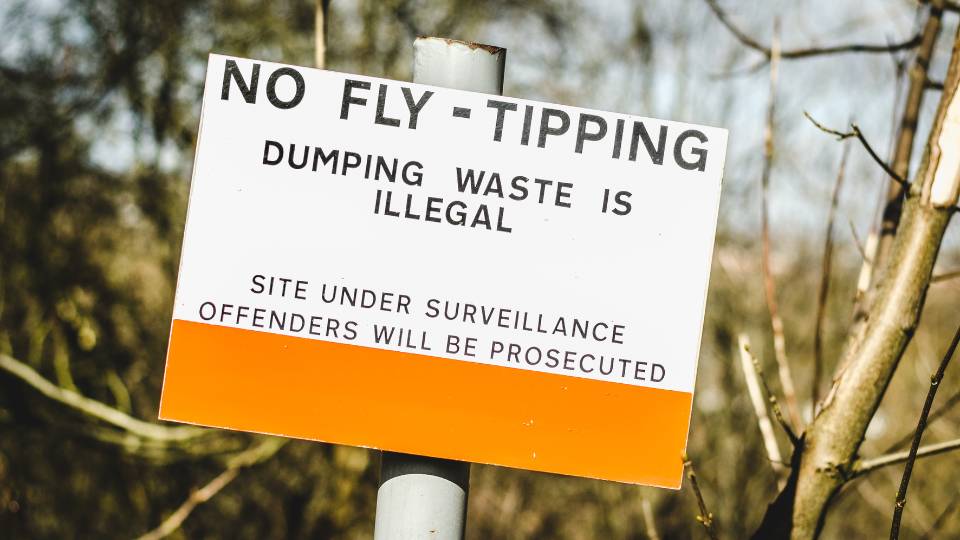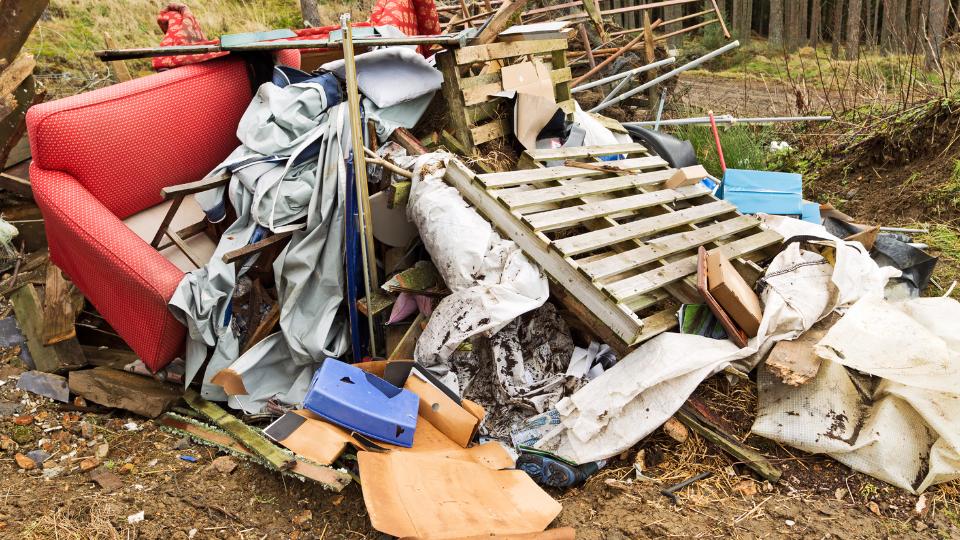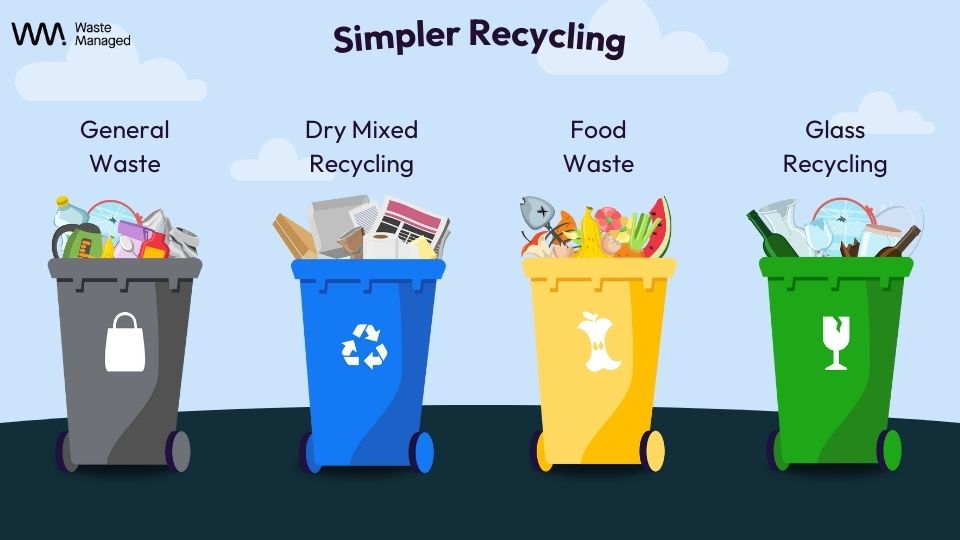
Fly tipping, the illegal dumping of waste in unauthorised areas has emerged as a critical issue posing significant harm to both local communities and the environment.
This pervasive problem transcends geographical boundaries, affecting urban and rural areas alike. The ramifications of fly-tipping are extensive and encompass a wide array of detrimental effects on our surroundings and society.
Fy tipping contributes to environmental degradation, adversely impacting local ecosystems and wildlife habitats.
To ensure the protection of our local countryside it is essential that we report fly tipping to the appropriate authorities to ensure that the crime doesn’t persist.
Steps to report fly-tipping
To report fly-tipping and request clearance of dumped waste on Council-owned land and highways, follow the steps below.
If you witness fly tipping being commited in progress, contact the police immediately on 999 to report the crime.
Note that this process specifically pertains to reporting and requesting clearance for fly-tipped items on public property:
1 – Gather Necessary Information:
Collect essential details about the fly-tipping incident, such as the precise location, date, and time of the dumping, a description of the waste, and any other pertinent information.
You can find your council’s local environmental health department here by entering your postcode.
2 – Confirm Eligibility for Council Clearance:
Ensure that the fly-tipping occurred on Council-owned land or highways, as the Council typically handles clearance only on their property.
3 – Contact Your Local Council Environmental Health Department: Reach out to the local council’s environmental health department using the provided email or contact number.
4 – Provide Detailed Information: When reporting the fly-tipping incident, furnish the following information:
- The exact location and type of land where the fly-tipping occurred.
- Date and time the fly-tipping was observed, including when the offence started and ended.
- Description of the person(s) involved in fly-tipping.
- Your location at the time of witnessing the incident.
- Your name and contact details.
- Details of any other witnesses present during the incident.
- Description of the vehicle involved (make, colour, markings) and its registration number.
- Type and estimated quantity of the waste that was dumped.
4 – Submit the Report:
Either send an email or call the local council’s environmental health department to report the fly-tipping incident.
Provide all the gathered information in a clear and comprehensive manner.
5 – Follow Up with the Council:
If necessary, follow up with the council to inquire about the progress of the clearance and any actions taken regarding the reported fly-tipping.
6 – Do Not Confront or Handle Waste:
Do not put yourself at risk by handling the waste or confronting the fly-tippers.
If possible, safely obtain photographic or video evidence, but prioritise your safety and well-being.
Remember, for incidents of fly-tipping on private land, the landowner needs to request clearance and pay for the service.
Additionally, for witnessing fly-tipping in progress, contact the police using the provided emergency or non-emergency numbers.
For waste near watercourses, contact the Environment Agency incident hotline.

How can you report fly-tipping on private land?
Reporting fly-tipping on private land involves notifying the relevant authorities about the illegal dumping of waste that has occurred on privately owned property.
Here’s a step-by-step guide on how to report fly-tipping on private land in the UK:
1 – Verify the Location and Ownership:
Ensure that the fly-tipping incident indeed occurred on private land by confirming ownership or rights over the property.
It’s essential to establish that the waste is dumped on privately owned or managed premises.
2 – Document the Details of the Fly-Tipping:
Gather all relevant information about the fly-tipping incident, including:
- The exact location where the fly-tipping occurred on the private land.
- Date and time the fly-tipping was observed.
- Description of the waste dumped.
- Any identifiable features of the waste or items dumped.
3 – Take Photographs or Videos: If possible and safe to do so, capture clear photographs or videos of the dumped waste.
These visual records can serve as important evidence for authorities.
4 – Contact the Local Council or Environmental Health Department:
Reach out to your local council or the environmental health department responsible for the area where the private land is located.
Use their designated contact information, which may include a phone number, email address, or online reporting form.
5 – Report the Fly-Tipping Incident:
Provide the gathered information and evidence to the relevant authority through the reporting channel you have chosen (phone, email, or online form). Include details such as:
- Your contact information (name, phone number, and/or email address).
- Description of the fly-tipping incident.
- Any photographic or video evidence you have captured.
6 – Follow Up on the Report:
If necessary, follow up with the local council or environmental health department to inquire about the progress of your report and any actions taken to address the fly-tipping on private land.
7 – Engage with Landowner or Property Manager:
If you are not the landowner but are aware of the incident, inform the landowner or property manager about the fly-tipping and encourage them to report it officially to the authorities.
8 – Ensure Safety and Compliance with Laws:
Always prioritise safety when addressing fly-tipping on private land.
Avoid handling hazardous waste or confronting fly-tippers directly.
Focus on reporting the incident to the appropriate authorities.
By promptly reporting fly-tipping on private land, you contribute to maintaining a clean environment and holding those responsible accountable for their actions.
What are the penalties for fly-tipping in the UK?
Fly-tipping, the illegal dumping of waste, is a serious offence in the UK, and penalties are in place to deter this unlawful activity and protect the environment.
Penalties for fly-tipping vary depending on the severity of the offence, the scale of the dumping, and whether it is categorised as a criminal or civil offence.
Here’s an overview of the penalties:
- Fixed Penalty Notices (FPNs): Local authorities can issue Fixed Penalty Notices (FPNs) to individuals caught fly-tipping.
FPNs are fines that typically range from a few hundred to a thousand pounds. The specific amount varies by region.
- Prosecution and Criminal Penalties: Fly-tipping is a criminal offence, and those found guilty can face significant penalties through the criminal justice system, including:
- Fines: Unlimited fines can be imposed by a court, and the amount depends on the severity of the fly-tipping and its impact.
- Imprisonment: Individuals convicted of serious fly-tipping offences may face imprisonment for up to 5 years.
- Fines: Unlimited fines can be imposed by a court, and the amount depends on the severity of the fly-tipping and its impact.
- Vehicle Seizure and Forfeiture: Authorities have the power to seize and forfeit vehicles used for fly-tipping.
This acts as a deterrent to individuals and businesses engaging in illegal waste dumping.
- Community Service and Orders: Offenders may be required to complete community service or other court-imposed orders as part of their penalty for fly-tipping.
- Clean-Up Costs and Compensation: Offenders may be ordered to cover the costs of cleaning up the dumped waste and restoring the affected area.
They could also be required to compensate the landowner or local authority for any damage caused.
- Environmental Offenses and Regulatory Action: In addition to criminal charges, offenders may face civil penalties related to environmental offences.
Regulatory action may include injunctions, orders to prevent future offences, or closure of sites involved in fly-tipping.
- Director Disqualification: Directors of companies involved in fly-tipping may face disqualification from acting as director for a specified period.
- Enforcement Undertakings: In certain cases, authorities may accept an enforcement undertaking, where the offender takes specific actions to remedy the harm caused by the fly-tipping.
It’s important to note that penalties can vary between different regions of the UK, and they may be subject to updates or changes in legislation.
The severity of the penalty depends on factors such as the amount and type of waste dumped, the impact on the environment and public health, and whether the offender is an individual or a business.

UK Fly Tipping Statistics
- In 2021/22, local authorities in England dealt with approximately 1.09 million fly-tipping incidents, marking a 4% decrease from the 1.14 million incidents reported in 2020/21.
- The proportion of fly-tips involving household waste dropped from 65% to 61% in 2021/22.
Specifically, there were 671,000 incidents involving household waste during this period, demonstrating a 9% decrease from the 740,000 incidents recorded in 2020/21.
- Highways (pavements and roads) were the primary location for fly-tipping, accounting for over two-fifths (43%) of total incidents in 2021/22, consistent with figures from 2019/20 and 2020/21.
The number of highway incidents in 2021/22 was 464,000, reflecting a 5% decrease from the 486,000 incidents reported in 2020/21.
- Size categories for fly-tipping incidents in 2021/22 indicated that the most common category was equivalent to a ‘small van load,’ comprising 32% of total incidents.
This was followed by the equivalent of a ‘car boot or less’ at 26%.
Around 37,000 incidents, or approximately 4% of the total, were classified as ‘tipper lorry load’ size or larger, showing a 3% decrease from the 38,000 incidents reported in 2020/21.
- The cost of clearance for larger fly-tipping incidents, categorised as ‘tipper lorry load’ size or larger, to local authorities in England during 2021/22 was £10.7 million, compared to £11.6 million in 2020/21.
- Local authorities conducted 507,000 enforcement actions during 2021/22, reflecting an 11% increase from the 455,000 actions performed in 2020/21.
Notably, the issuance of fixed penalty notices saw a significant rise, with 91,000 notices issued in 2021/22, marking a 58% increase from the 57,700 issued in 2020/21.
Fixed penalty notices were the second most common action after investigations, constituting 18% of all actions in 2021/22.
- The number of court fines nearly tripled from 621 in 2020/21 to 1,798 in 2021/22 (190%). Moreover, the total fines’ value more than doubled from £330,000 in 2020/21 to £840,000 in 2021/22 (154%).
Organised Crime in the Waste Management Industry

Organised crime in the waste management sector, often referred to as “waste crime” or “environmental crime,” involves various illegal activities related to the handling, disposal, and management of waste for financial gain.
These activities can have detrimental effects on the environment, public health, and the legitimate waste management industry.
While organised crime in waste management is not unique to the UK, it is a significant concern in many countries, including the UK.
Here are some key aspects of organised crime in waste management in the UK:
- Illegal Waste Disposal and Dumping: Organised crime groups may engage in illegal waste disposal and dumping to avoid disposal costs and maximise profits.
This often involves dumping waste in unauthorised locations such as abandoned sites, public lands, or even in water bodies. Illegal dumping poses significant environmental and health risks.
- Waste Fraud and Tax Evasion: Criminal organisations may engage in fraudulent activities related to waste management, such as misreporting waste quantities, falsely labelling waste types, or evading taxes and regulatory fees associated with waste disposal.
This allows them to reduce costs and increase profits.
- Fake Recycling and Exportation: Some criminal groups falsely claim to recycle waste materials, when in reality, they may illegally export waste to other countries or send it to unauthorised disposal sites.
They might forge documents and misrepresent waste types to circumvent recycling regulations.
- Infiltration of Legitimate Waste Companies: Organised crime groups may infiltrate legitimate waste management companies by establishing front businesses or corrupting employees.
They exploit these companies to facilitate illegal activities, including illegal disposal, waste trafficking, or tax evasion.
- Waste Trafficking: Criminal organisations may traffic waste materials, such as hazardous or electronic waste, to countries with lax environmental regulations.
This illegal trade can result in improper disposal, environmental pollution, and adverse health effects.
- Intimidation and Violence: Organised crime groups may use intimidation, violence, or threats to control waste management territories, influence regulatory decisions, or deter whistleblowers from reporting illegal activities.
- Money Laundering: Criminals involved in waste management may use the industry to launder money acquired through various illegal activities.
They may set up shell companies, manipulate financial transactions, and conceal the origins of illicit funds.
Efforts to combat organised crime in waste management in the UK include enhanced regulation, increased surveillance, collaboration between law enforcement agencies and environmental regulators, public awareness campaigns, and penalties for offenders.
The UK Environment Agency and local authorities play crucial roles in enforcing regulations and investigating waste-related crimes.
Reporting fly-tipping is imperative to securing environmental protection & we all have a responsibility when we witness illegal activity.
However, addressing this issue effectively requires a multi-agency and international approach to tackle the various facets of organised waste crime.








